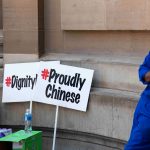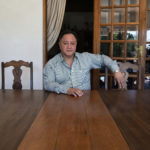Dramatic turn in anti-Chinese hate speech case
Amid Judge Motsamai Makume declining to admit certain evidence into the record, the legal representative of one of the accused asked the judge to recuse himself, citing allegations of bias.
Author:
6 December 2019

It’s 32°C and the air conditioner in Court GC at the South Gauteng High Court in Johannesburg has malfunctioned. It’s blowing hot air instead of cooling the room, making the already tense atmosphere even more uncomfortable.
Judge Motsamai Makume was asked by an eighth respondent, Mariette van der Linde de Klerk, to hear an application on whether or not he was fit to continue to hear the matter on anti-Chinese hate speech.
The Chinese Association (TCA) opened a case against 12 respondents, who are alleged to have made “racist, xenophobic and genocidal” comments on the Facebook pages of welfare organisation Karoo Donkey Sanctuary and investigative journalism television show Carte Blanche. These comments were made after Carte Blanche aired an exposé on the donkey skin trade in 2017, two days after the annual Chinese New Year celebrations.
Related article:
The matter came before the high court in early March and could not be finalised. It was postponed to 2 October 2019 for a social media lawyer, Emma Sadleir, to complete her testimony as a factual witness.
But there was a dramatic twist as Van der Linde de Klerk’s legal representative, advocate Collin Garvey, alleged that the judge had prejudged the case and therefore should recuse himself in the interest of justice and a fair trial. The complainants opposed this application.
Slow wheels of justice
Before this bombshell, the matter resumed on 25 November. TCA called four witnesses to give evidence, but only TCA chair Erwin Pon gave oral evidence. He was in the witness box being cross-examined for seven days.
His cross-examination had to be stopped temporarily on two occasions for the court to deal with interlocutory applications – a case within a case. The first stop came when Garvey asked Pon if he had read the affidavit of an expert they intended to bring to court.

Pon had not read nor seen the affidavit. The request for Pon to go through the affidavit was met with an emphatic objection from advocate Faizel Ismail, who told the court this evidence could not be used as they had objected to it and the court had not ruled on its admissibility.
Makume agreed with Ismail, saying that if Van der Linde de Klerk wanted to use this evidence, they had to stop cross-examining the witness for the court to deal with arguments on why the affidavit of the expert should be admitted as evidence.
Garvey, after receiving instructions, elected to prepare arguments on why the court should admit the evidence of an expert.
Belittling the suffering
Malcolm Barendse, representing fourth respondent David Clive Horne, commenced with cross-examination for the remainder of the day. Barendse began by reading notes from his laptop about human and animal rights violations. The judge asked him to put questions to the witness and stop reading history to the court. After a tussle of words, the judge cautioned him to stop using a condescending tone when addressing the court.
Barendse asked Pon, “Don’t we as South Africans have bigger things to focus on, with enough troubles, whether it be human or animal rights violations throughout South Africa, unemployment, corruption, whatever it might be? Don’t you feel, without demeaning your position, that as a matter of perspective, in terms of the greater scheme of things, this is a small issue?”
Pon did not take kindly to this line of questioning, saying it was precisely this kind of thinking that had rendered the humanity of Chinese people invisible and insignificant.
“No, I don’t think that it is small … It is [an] insult for someone to think that it doesn’t matter, [to] think that our lives do not matter,” Pon said. There were nods and applause from the gallery.
Related article:
When an objection was raised by one of the legal representatives on the manner in which Pon responded, Makume said the question itself invited such a reaction from the witness as it trivialised their case.
Barendse told the court that his client’s Facebook comment was altered and therefore could not amount to hate speech as alleged. He further submitted his client’s medical report, showing the court that he had suffered a breakdown because of the allegations.
On 28 November, the court heard arguments on why the Van der Linde de Klerk affidavit should be admitted. Makume ruled that the complainants would be prejudiced if the court dispensed with the rules and admitted the affidavit.
Garvey asked Pon to show him the original data that connects his client and the comment made on Facebook. He told the court they had requested on several occasions original documents from the complainants but that these were not forthcoming. He insisted their expert witness was the only person who could assist the court on how to obtain the “original documents” because screenshots of the comments were copies, not original evidence. Ismail protested against Garvey’s insistence on using the evidence of an expert witness whom the court had ruled could not give evidence.
Garvey responded that their expert was actually a factual witness. Ismail protested again, saying Garvey wanted to use expert evidence dressed up as a factual witness. The judge ruled that this evidence could not be admitted, and Garvey should not ask questions using the affidavit on which the court had already ruled.
Confessions
This is where the second stop to Pon’s cross-examination came about. Garvey asked the judge to stand the matter down for five minutes, so he could consult with his instructing attorney and the client. A few minutes later, all the legal representatives went into the judge’s chambers.
On their return, the judge told the court that he had been asked to recuse himself as the presiding officer in the matter. This meant the van der Linde de Klerk could not continue with the cross-examination.
In the interest of time, the complainants elected to use the remainder of the afternoon to deal with the respondents who had made confessions and some who had elected not to oppose the proceedings. One such confessor, the 10th respondent, Ryan van der Walt, had been in court from the beginning of the inquiry in March.
Van der Walt tendered an unconditional apology and said he realised the “comment, and the forum in which it was posted was particularly hurtful in the light of the long history of unfair discrimination against Chinese people in South Africa under colonialism and apartheid”.
He agreed to abide by the court order and publish the apology on his personal Facebook page, and pin it as the top post on his page for a period of six months. He further committed to do 500 hours of community service and attend a sensitisation programme facilitated by the South African Human Rights Commission. Respondents who did not file confessions would take default judgments, meaning they would have to abide by the court order.
Before Garvey addressed the court on the recusal application, he brought to its attention the recent controversial decision of the Supreme Court of Appeal in the case Qwelane vs the South African Human Rights Commission. The appeals court declared Section 10 of the Promotion of Equality and Prevention of Unfair Discrimination Act unconstitutional.
The decision will inevitably affect the current case as it deals directly with Section 10 of the Equality Act. But how, exactly, remains uncertain as the unconstitutionality of the section is yet to be confirmed by the Constitutional Court.
Recusal application
The perceived bias on the part of the judge came about after several decisions were made against Van der Linde de Klerk. Garvey told the court that the decision to dismiss the evidence of an expert was the last straw. The complainants knew the witness was a “sledgehammer” to their case, so they wanted to suppress the evidence.
Ismail replied that the Van der Linde de Klerk intentions were not sincere. This, Ismail argued, was evident by the respondent’s argument that if the judge admitted the evidence of their expert witness, he could continue to hear the matter.
Makume dismissed the application to have him recused with costs, saying that the arguments for Van der Linde de Klerk failed to demonstrate the alleged bias. The judge further held that he had simply applied the rules of court. The recusal would have had a devastating effect on the complainants, who have waited two years to have their case heard.
Related article:
Pon finished giving evidence on the Van der Linde de Klerk questions and the complainants closed their case. The Van der Linde de Klerk side elected not to call any witnesses and also closed their case.
Fourth respondent Horne, lead by Garvey, gave oral evidence on Thursday 5 December around the comment he posted to Facebook, “I say wipe them out, I will be the first to be there”, which he said was taken out of context. “Them” in the comment was not a reference to Chinese people, he said. Advocate Ben Winks contradicted this in his cross-examination, saying it was the position of TCA that “them” referred to Chinese people.
The judge had heard all the evidence by the end of Thursday. After receiving the hearing record, parties are to exchange heads of argument and the oral arguments will be heard in February, depending on the availability of the judge.
Pon, quoted in the TCA statement, said: “We believe the court will see that our case against these heinous comments is indisputable. In a diverse democracy such as ours, underpinned by principles of equality and dignity, it cannot be acceptable to say about a particular group of people, ‘wipe them out’ or ‘get rid of them’.”



